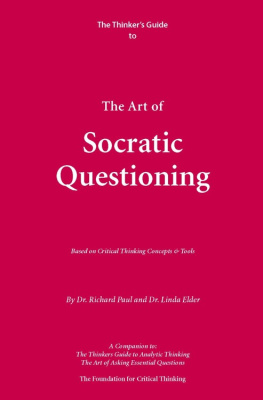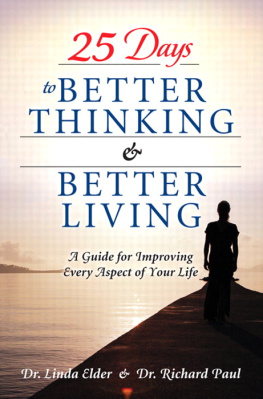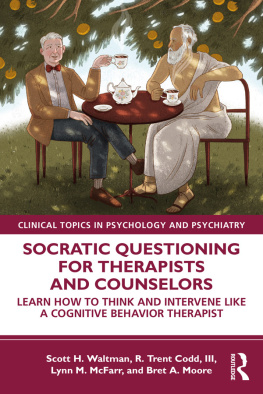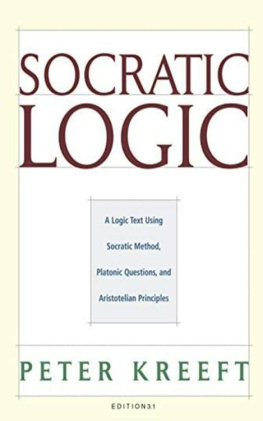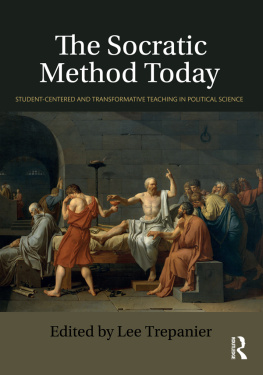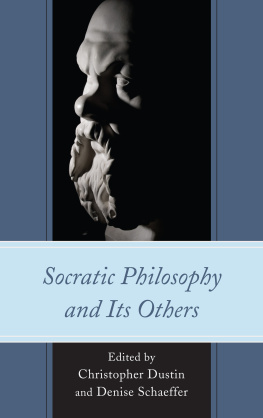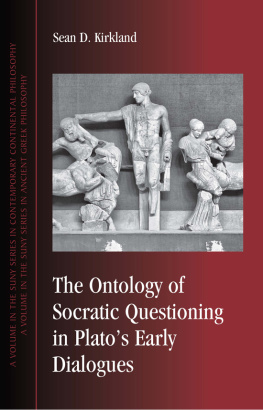Richard Paul - The Thinker’s Guide to The Art of Socratic Questioning
Here you can read online Richard Paul - The Thinker’s Guide to The Art of Socratic Questioning full text of the book (entire story) in english for free. Download pdf and epub, get meaning, cover and reviews about this ebook. year: 2007, publisher: Foundation for Critical Thinking, genre: Religion. Description of the work, (preface) as well as reviews are available. Best literature library LitArk.com created for fans of good reading and offers a wide selection of genres:
Romance novel
Science fiction
Adventure
Detective
Science
History
Home and family
Prose
Art
Politics
Computer
Non-fiction
Religion
Business
Children
Humor
Choose a favorite category and find really read worthwhile books. Enjoy immersion in the world of imagination, feel the emotions of the characters or learn something new for yourself, make an fascinating discovery.
- Book:The Thinker’s Guide to The Art of Socratic Questioning
- Author:
- Publisher:Foundation for Critical Thinking
- Genre:
- Year:2007
- Rating:3 / 5
- Favourites:Add to favourites
- Your mark:
- 60
- 1
- 2
- 3
- 4
- 5
The Thinker’s Guide to The Art of Socratic Questioning: summary, description and annotation
We offer to read an annotation, description, summary or preface (depends on what the author of the book "The Thinker’s Guide to The Art of Socratic Questioning" wrote himself). If you haven't found the necessary information about the book — write in the comments, we will try to find it.
The Thinker’s Guide to The Art of Socratic Questioning — read online for free the complete book (whole text) full work
Below is the text of the book, divided by pages. System saving the place of the last page read, allows you to conveniently read the book "The Thinker’s Guide to The Art of Socratic Questioning" online for free, without having to search again every time where you left off. Put a bookmark, and you can go to the page where you finished reading at any time.
Font size:
Interval:
Bookmark:
Of course, to learn from Socrates we must identify and practice applying the components of his art. Without a sense of these components, it is hard to grasp the nature of the questioning strategies that underlie the art of Socratic questioning. The art requires contextualization. And in that contextualization, the spirit of Socratic questioning is more important than the letter of it.
In this guide, we provide analyses of the components of Socratic questioning, along with some contemporary examples of the method applied in elementary through high school classes.
To get you started in practicing Socratic questioning, we begin with the nuts and bolts of critical thinking (Part One), followed by some examples of Socratic dialogue (Part Two), and then the mechanics of Socratic dialog (Part Three). The fourth and fifth sections focus on the importance of questioning in teaching, the contribution of Socrates, and the link between Socratic questioning and critical thinking.
As you begin to ask questions in the spirit of Socratesto dig deeply into what people believe and why they believe ityou will begin to experience greater command of your own thinking as well as the thinking of others. Be patient with yourself and with your students. Proficiency in Socratic questioning takes time, but time well worth spending.
We hope this guide is of use to you and your students in achieving greater command of the art of deep questioning.
 |  |
| Richard Paul Center for Critical Thinking | Linda Elder Foundation for Critical Thinking |
Teachers, students, or indeed anyone interested in probing thinking at a deep level canand should construct Socratic questions and engage in Socratic dialogue. When we useSocratic questioning in teaching, our purpose may be to probe student thinking, to determine the extent of their knowledge on a given topic, issue or subject, to model Socraticquestioning for them, or to help them analyze a concept or line of reasoning. In the finalanalysis, we want students to learn the discipline of Socratic questioning, so that they beginto use it in reasoning through complex issues, in understanding and assessing the thinkingof others, and in following-out the implications of what they, and others think.
In teaching, then, we can use Socratic questioning for at least two purposes:
- To deeply probe student thinking, to help students begin to distinguish what theyknow or understand from what they do not know or understand (and to help themdevelop intellectual humility in the process).
- To foster students' abilities to ask Socratic questions, to help students acquire thepowerful tools of Socratic dialogue, so that they can use these tools in everyday life (in questioning themselves and others). To this end, we need to model the questioningstrategies we want students to emulate and employ. Moreover, we need to directly teachstudents how to construct and ask deep questions. Beyond that, students need practice,practice, and more practice.
Socratic questioning teaches us the importance of questioning in learning (indeed Socrates himself thought that questioning was the only defensible form of teaching). Itteaches us the difference between systematic and fragmented thinking. It teaches us to digbeneath the surface of our ideas. It teaches us the value of developing questioning minds incultivating deep learning.
The art of Socratic questioning is intimately connected with critical thinking becausethe art of questioning is important to excellence of thought. What the word "Socratic" addsto the art of questioning is systematicity, depth, and an abiding interest in assessing thetruth or plausibility of things.
Both critical thinking and Socratic questioning share a common end. Critical thinkingprovides the conceptual tools for understanding how the mind functions (in it's pursuit of meaning and truth); and Socratic questioning employs those tools in framing questionsessential to the pursuit of meaning and truth.
The goal of critical thinking is to establish an additional level of thinking to our thinking, a powerful inner voice of reason, that monitors, assesses, and reconstitutesin a morerational directionour thinking, feeling, and action. Socratic discussion cultivates thatinner voice through an explicit focus on self-directed, disciplined questioning.
In this guide, we focus on the mechanics of Socratic dialogue, on the conceptual toolsthat critical thinking brings to Socratic dialogue, and on the importance of questioningin cultivating the disciplined mind. Through a critical thinking perspective, we offer asubstantive, explicit, and rich understanding of Socratic questioning.
To get you started in practicing Socratic questioning, we begin with the nuts and boltsof critical thinking (Part One), followed by some examples of Socratic dialogue (Part Two),and then the mechanics of Socratic dialogue (Part Three). The fourth and fifth sectionsfocus on the importance of questioning in teaching, the contribution of Socrates, and thelink between Socratic questioning and critical thinking.
- Raises basic issues
- Probes beneath the surface of things
- Pursues problematic areas of thought
- Helps students discover the structure of their own thought
- Helps students develop sensitivity to clarity, accuracy, relevance, and depth
- Helps students arrive at judgments through their own reasoning
- Helps students analyze thinkingits purposes, assumptions, questions, points ofview, information, inferences, concepts, and implications
Based in Critical Thinking Concepts
As teachers, then, we need to understand the conceptual tools that critical thinkingbrings to Socratic questioning, and we need to foster student understanding of them. Inthis section we focus briefly on the following foundational critical thinking concepts:
Font size:
Interval:
Bookmark:
Similar books «The Thinker’s Guide to The Art of Socratic Questioning»
Look at similar books to The Thinker’s Guide to The Art of Socratic Questioning. We have selected literature similar in name and meaning in the hope of providing readers with more options to find new, interesting, not yet read works.
Discussion, reviews of the book The Thinker’s Guide to The Art of Socratic Questioning and just readers' own opinions. Leave your comments, write what you think about the work, its meaning or the main characters. Specify what exactly you liked and what you didn't like, and why you think so.

